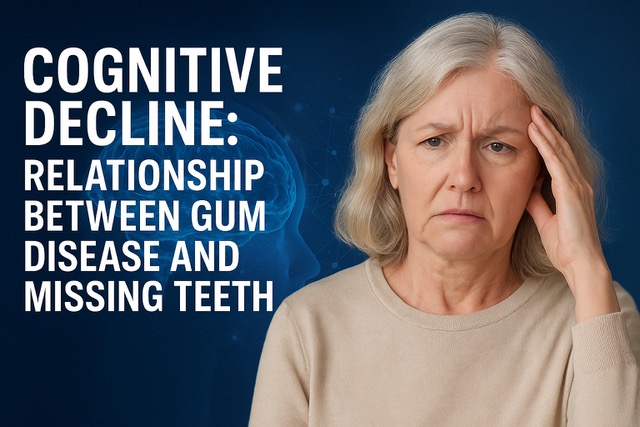
At Advances in Dentistry, we have been diagnosing and treating periodontal disease for over 30 years. Our team, led by dentists— voted among the Best Dentists in Oklahoma City—is skilled in identifying the early signs of gum disease and preventing serious complications, including potential links to cognitive decline. Today, growing evidence supports the connection between oral health and brain health, particularly through the mechanisms of infection, occlusion and mastication. This blog explores the research behind this critical relationship and what you can do to protect both your smile and your mind.
Understanding the Link: Periodontal Disease and the Brain
Periodontal disease is a chronic bacterial infection of the gums that, if left untreated, can lead to tooth loss and systemic health issues. Research now suggests that it may also play a significant role in cognitive decline and Alzheimer’s disease.
Porphyromonas Gingivalis and Alzheimer’s Disease
One of the primary bacteria involved in periodontal disease is Porphyromonas gingivalis (P. gingivalis). Recent studies have found this pathogen in the brains of Alzheimer’s patients. Even more striking, its toxic byproducts—known as gingipains—have been identified in brain tissues and linked directly to brain damage and the accumulation of amyloid plaques, a hallmark of Alzheimer’s disease.
Animal models have shown that oral infection with P. gingivalis can lead to colonization of the brain, increase amyloid plaques and interfere with normal nerve function. Treatments that block gingipains show promise in reducing infection and slowing cognitive decline. These findings suggest that managing periodontal infections may be key in Alzheimer’s prevention.
The Hidden Role of Occlusion and Mastication
While bacterial infection is a direct link, there is also another less obvious but important connection: the role of occlusion (how your teeth align and come together) and mastication (chewing function).
Why Chewing Matters to Your Brain
Chewing does not just help with digestion; it also stimulates regions of the brain associated with memory and cognition. Animal studies have shown that mice fed a soft diet (limiting chewing activity) experience impaired memory, reduced nerve growth in the hippocampus (a key brain region for memory) and fewer neural connections.
In Alzheimer’s-prone animal models, poor mastication leads to muscle atrophy in the jaw and increased amyloid plaques in parts of the brain tied to chewing and memory. This indicates that reduced chewing capacity may accelerate brain degeneration.
Tooth Loss and Cognitive Decline
Human studies back up these findings. In multiple cross-sectional and longitudinal studies, older adults with fewer teeth and poor chewing ability were significantly more likely to experience cognitive decline or dementia. One notable finding: people with periodontitis had six times the rate of cognitive decline compared to Alzheimer’s patients without gum disease.
Furthermore, it is not just about tooth count. Studies highlight that chewing efficiency, not simply having teeth or dentures, is what truly matters. Patients who have tooth replacements but still struggle to chew hard foods are also still at risk.
Evidence from Clinical Studies
Cross-sectional studies in Sweden, South Korea and the U.S. show a consistent trend: people with more tooth loss or impaired chewing ability score lower on memory and mental state exams. Even MRI studies show that those with more missing teeth have reduced grey matter, especially in the hippocampus.
Long-term studies also reinforce the link. In a 10-year study in South Korea, participants with poor chewing function had a 28% higher risk of developing dementia. Another study using Japan’s national health database found that edentulous individuals (those without teeth) were significantly more likely to suffer from cognitive impairment.
The Role of Professional Dental Care
These findings underscore the importance of maintaining good oral health—not just for your teeth and gums, but for your brain. At Advances in Dentistry, we offer thorough periodontal evaluations and early intervention to stop gum disease before it becomes severe.
We also emphasize the importance of preserving occlusion and mastication. Whether through periodontal therapy, implants or prosthetic rehabilitation, we help patients maintain or restore proper chewing function and tooth support. Our preventive approach aims to reduce not just tooth loss, but potentially your risk of dementia down the line.
Prevention Starts with Early Detection
Many signs of periodontal disease are silent until advanced stages. Bleeding gums, bad breath, receding gums, loose teeth—these are warning signs. But even before these appear, subtle inflammation can be detected by trained dental professionals.
That is where our experience shines. With over three decades of expertise and a reputation as Oklahoma City’s Best Dentist, Advances in Dentistry is uniquely qualified to spot the early signs of periodontal disease and act before damage spreads.
What You Can Do to Protect Your Oral and Cognitive Health
Daily Habits:
- Brush twice a day with fluoride toothpaste
- Floss daily
- Use antimicrobial mouth rinses if recommended
- Eat a balanced, fibrous diet to encourage chewing and stimulate the brain
Regular Dental Visits:
- Schedule exams and cleanings every six months
- Discuss any issues with chewing, jaw pain or gum sensitivity
- Ask about periodontal screening and 3D imaging for detailed analysis
Consider Restorative Options:
- Replace missing teeth with implants or bridges
- Correct bite alignment for better mastication
- Address gum disease early with non-surgical or surgical therapies
Advances in Dentistry: Your Partner in Whole-Body Health
The connection between periodontal disease, occlusion and cognitive decline is clear: your mouth is the gateway to your brain. Our mission at Advances in Dentistry is to keep that gateway healthy and strong.
If you or a loved one are concerned about gum disease, tooth loss or memory changes, do not wait. Early diagnosis and treatment can make all the difference.
Book your appointment today and take the first step toward protecting your smile and your mind.
Want to Take Charge of Your Dental Health?
Discover our Dental Assurance Plan—an affordable alternative to traditional insurance. Get preventive care, discounts and more with no paperwork or waiting periods.


